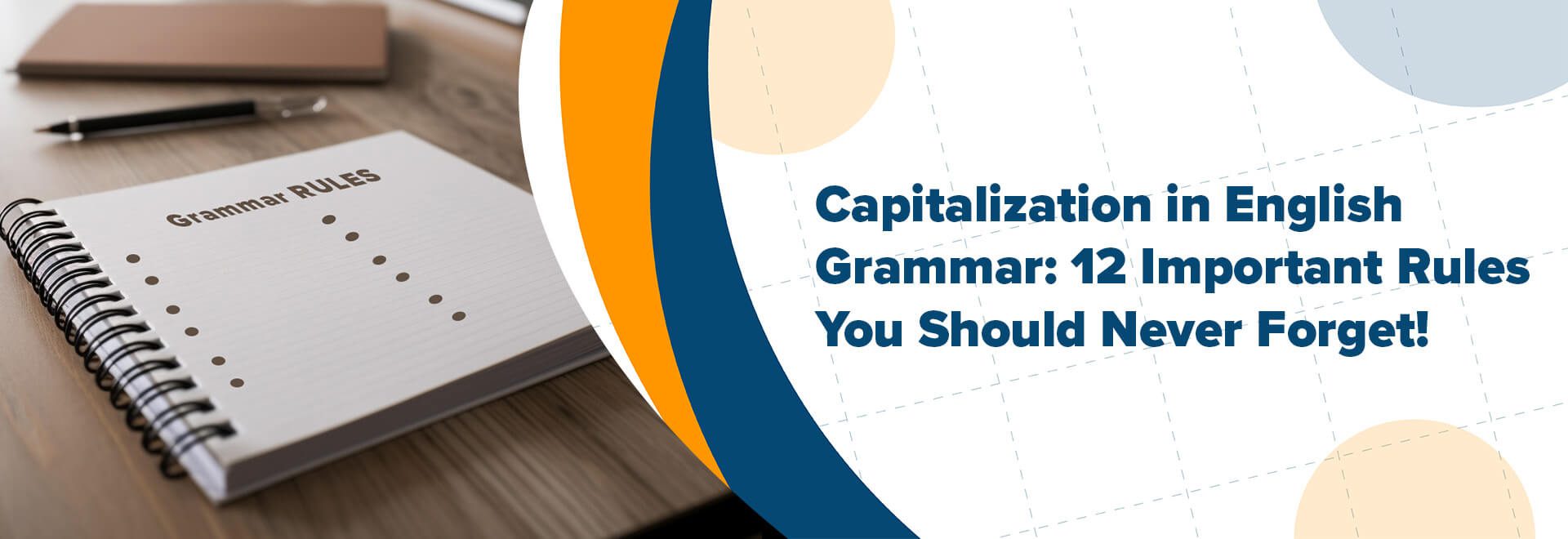
12 Important Capitalization Rules in English Grammar
Language learning is not just about speaking fluently in the English language, but also about writing with correctness and accuracy. In writing, there are some specific rules to follow in order to have a good writing result. Thus, capitalization is one of the most essential aspects of writing that we should consider.
The Role of Capitalization in English Grammar
Capitalization plays a crucial role in English grammar as it helps in conveying a message and emphasizing a specific word or word pattern. If you are interested in writing, you know you must be knowledgeable of some writing rules like capitalization. On the other hand, if you are not into it, for sure you only know the basics and sometimes forget them when you are writing. There are, in fact, various situations where the knowledge of capitalization rules is important.
In the business world, writing an email is important. It is crucial to know the rules of capitalization. An email can seem to be informal if it does not follow the correct rules. When you apply for a job, the appearance of your resume is sometimes one of the bases for employers to consider you for the position, especially when you are applying for a writing job.
In education, teachers must be adept at writing styles and strokes as sometimes they ask their students to write an essay or answer a specific discussion question. Students are also trained on how to write with the correct capitalization of words. During their thesis, they are also taught to observe the correct capitalization of words used appropriately in context.
In the media, journalists make sure that their writing result is compelling and accurate in the readers’ view. They must observe proper capitalization of words that need to be capitalized and those that are not.
Capitalization is an essential aspect of English grammar that can significantly impact the clarity and professionalism of your writing. It is important to understand the rules of capitalization in English grammar to avoid mistakes and make your communication effective.
12 important rules of capitalization in English grammar
- Always capitalize the first letter of the first word in every sentence.
This is the easiest rule. This rule always applies to all kinds of sentences, regardless of their length and their tense.
- Capitalize proper nouns.
A proper noun refers to the names of specific people, places, organizations, events, titles before names, brand names, etc. Notice the first letter of proper nouns is capitalized. Look at the example below.
People: Barack Obama;
Places: Beijing, China; Tokyo, Japan
Organization: American Football League
Events: World War II
Title: President Joe Biden, Dr. John Smith
Brand Names: Samsung, Apple
Note: Capitalization of the first letter of these words must be observed regardless of their position in the sentence.
Example: Dr. John Smith uses a Samsung smartphone during his virtual consultation.
- Capitalize days, months, and holidays
Days, months, and holidays are considered proper nouns so they must be capitalized.
Days: Monday, Tuesday
Months: June, July
Holidays: Christmas Day, New Year’s Day
- Capitalize seasons when used as a proper noun or as a major word in a title.
Spring Festival 2023
The Winter Sun
- Capitalize book, blog, article titles, and headings
When it comes to titles and headings, it is important to capitalize the primary words. This includes nouns, pronouns, verbs, adjectives, and adverbs. Articles, conjunctions, and prepositions with fewer than four letters should not be capitalized unless they are the first or last words of the title.
Examples:
Title: The Art of Writing; English in the Philippines: Interesting Facts You Need to Know
Heading: The Role of Capitalization in English Grammar
- Capitalize titles of people and their salutations
When referring to specific people’s titles, always capitalize the first letter.
President Joe Biden
Prime Minister Abe
Queen Elizabeth II
Mr. and Mrs. Brown
Miss Tanaka
- Capitalize acronyms
An acronym, as defined by the Cambridge Dictionary, is an abbreviation consisting of the first letters of each word in the name of something, pronounced as a word. Always capitalize acronyms.
NASA – National Aeronautics and Space Administration
FBI – Federal Bureau of Investigation
EFL – English as a Foreign Language
- Capitalize countries’ names, nationalities, and languages
When referring to nationalities or languages, always capitalize them.
Japan – Japanese – Nihonggo
China – Chinese – Mandarin
Brazil – Brazilian – Portuguese
9. Capitalize important historical events, periods of time, and documents
Significant historical events and important documents should be capitalized to highlight their significance.
Historical events: World War II, The Cold War
Document: The United States Constitution
Period of time: The Renaissance
- Always capitalize on famous landmarks, and historical places.
The names of famous landmarks, tourist attractions, and historical places must always be capitalized. Do not, however, capitalize prepositions and conjunctions.
The Great Wall of China
Sydney Opera House
Statue of Liberty
11. Use their proper names to capitalize on geographical features such as mountains, rivers, forests, etc.
Always capitalize the names of geographical features.
Mt. Fuji
Mount Everest
River Thames
Nile River
Amazon Forest
12. The pronoun “I” is always capitalized, regardless of its position in a sentence. This rule helps to distinguish it from other pronouns.
Examples:
I wrote a letter to my friend in India.
John and I went to see a movie last week.
My mother bought me a new necklace and I like it.

Being aware of the rules of capitalization is crucial because it makes your writing clear and helps you emphasize important words in your writing. It also helps convey meaning and provides a distinction between proper and common nouns.
Although you have already learned about capitalization rules, note that there are some exceptions to the rules. Take a look at them below:
Some Exceptions to the Rules
- When used in titles, headings, or acronyms, prepositions, articles, and conjunctions are not capitalized.
■ Harry Potter and the Sorcerer’s Stone
■ ESL – English as a Second Language
- Websites and email addresses are often not capitalized.
■ Website: “www.qqeng.net“
■ Email address: [email protected]
- Do not capitalize the titles of people when they do not precede their names.
■ Joe Biden, the president of the USA, spoke to the public.
■ I want to meet the queen of England.
■ They will have a conference with the prime minister of Japan on Friday.
- Seasons used generally should not be capitalized.
■ My favorite season is spring.
■ In summer, I will go swimming with my family in Hawaii.
- Only capitalize the first letter of a word after a full stop (.) and question mark (?) and when the word is a proper noun or the pronoun I. Do not capitalize the first letter of a word following certain punctuations such as comma, colon, semi-colon, and dash.
■ She called me at 2 AM today; thus, I am feeling sleepy.
■ I have three favorite pets: a bird, a rabbit, and a fish
- Do not capitalize common nouns.
■ Maria went to her hometown.
■ I thought you had taken my book with you.
You have now learned the rules and exceptions to capitalization in English grammar. It is important to be knowledgeable of these rules, especially when you aim for rich and meaningful writing. Check out your learning by participating in our quiz below.




